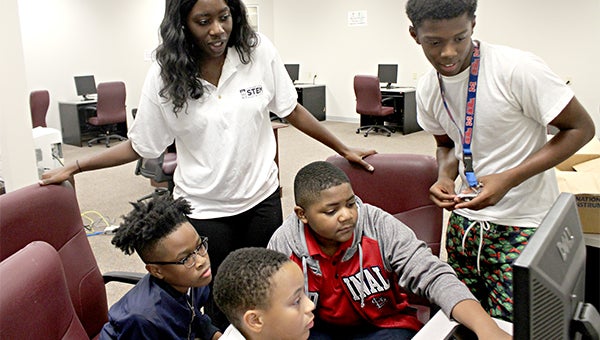Vicksburg students part of Army’s STEM program
Published 9:33 am Monday, October 10, 2016

- Standing from left, Jackson State University junior Mianwi Obioha, Warren Central High junior Kensell Batty, and sitting from left, Logan Lane, 13, Jaylon Winter, 9, Donald Taylor, 11, use the computer lab at the Alcorn State University Vicksburg campus Tuesday night for the weekly meeting of the Thurgood Marshall College Fund’s Vivian Burey Marshall STEM Pilot Initiative made up of college student mentors and local teachers and students from the public school district.
About 50 children of all ages in the Vicksburg Warren School District have received a little extra help in the STEM subjects — science, technology, engineering and mathematics.
Vicksburg was one of two in the country chosen to have the Thurgood Marshall College Fund’s Vivian Burey Marshall STEM Pilot Initiative funded by the U.S. Army to give students more opportunities to learn outside of the classroom through projects, experiences and one-on-one guidance.
“Our students have an opportunity to participate in a variety of experiences that are both in Vicksburg as well as in other places,” said Dawna Taylor-Thornton, the principal investigator and executive director of the Vivian Burey Marshall STEM Pilot Initiative for TMCF. “Back in March we took a group of students to Boston to participate in a national engineering conference.”
The free initiative was given the green light last September, and after working out all the details, students have been working in the program since March. The cohort of students meets year-round one to two evenings a week for two hours at the Alcorn State University Vicksburg campus.
The students have worked on projects with the Nissan Plant in Canton to learn about automotive engineering careers, dropped weather balloons for the National Weather Service in Jackson and did a six-week coding course online.
“Currently we are in full swing for our students in their competition season because the students are preparing for robotics competition,” Taylor-Thornton said, adding the students are broken into different groups and work on building their own robots.
Kensell Batty, a junior a Warren Central High School, said he got involved in the program because he plans on majoring in engineering when he goes to college.
“I actually like coming here,” Batty said. “I think they should reach out to more high school students.”
He said he has learned a lot of about science through the multiple hands-on experiments the students have done with acids and chemicals as well as learning about how diseases and germs spread, to name a few.
“I do more project-based things here,” Batty said.
Superintendent Chad Shealy said the partnership with TMCF is vital because of the amount of jobs becoming available in the STEM field, especially with the U.S. Army Corps of Engineers Engineer Research and Development Center located here.
“It’s going great. They’re a wonderful partner and our missions aligned,” Shealy said. “They’ve been flexible to our input, which I really appreciate.”
Dr. Prentiss McLin II is the fulltime program manager who leads the group. A few local teachers in the public school system are involved with the project as teacher fellows who learn new STEM integration strategies by working with the students in the program. Taylor-Thornton said the teacher fellows are not all STEM teachers either with both English teachers and a guidance councilor on the roster.
“We wanted to make sure that we incorporated people from other disciplines,” she said.
Students are assigned a mentor from Jackson State University or Alcorn State University who assist them with the projects each time they meet. This gives students extra one-on-one guidance to address their questions.
“The HBCU (Historically Black Colleges and Universities) mentors are students that are currently majoring in STEM. They are either sophomores, juniors or senior level students who are able to connect with the students to provide them advice and guidance. They also help prepare the students for any competitions they are involved in,” Taylor-Thornton said.
The initiative was created to encourage underrepresented students to participate in STEM learning. Shealy said it is important to also incorporate women and minorities in STEM education, and this initiative has helped the district expand the areas of study to more diverse people.
“It’s a necessity now that we begin to introduce students who are not traditionally represented in those engineering fields to STEM education,” Shealy said.
More students are now being accepted into the program. For more information or to apply, visit tmcf.org/vbm.





